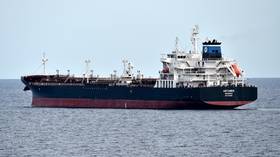EU split on Russian oil price cap escalates – Politico

The European Union will reportedly not impose an eighth round of sanctions on Moscow unless its member states agree to include a price cap on Russian oil exports.
This move has been opposed by several states and could further damage the bloc’s already reeling economy.
EU ambassadors met in Brussels on Monday morning in a bid to hammer out an agreement. In addition to penalties on Russian politicians and export restrictions on chemicals, electronics and aviation components, the leadership wants to impose a price cap on seaborne Russian oil exports.
Despite opposition from Hungary – which has opposed any further sanctioning of Russian energy – and pushback from Greece, Cyprus and Malta, an EU diplomat told Politico that “there will be no sanctions package without the oil price cap.”
The restriction would work by placing an embargo on all seaborne oil imports from Russia priced above a certain point. The amount would be set just above the cost of production, giving Russian producers just enough revenue to stay in business, while denying them the record profits they have been reaping since earlier sanctions drove market prices skyward.
The embargo would likely be enforced by shipping insurance firms, which would deny insurance to consignments of oil priced above the fixed point.
However, Russia could respond by simply refusing to ship its oil to countries paying such low prices, and sell it to other foreign buyers. Turkey, China and India are the three largest non-EU importers of Russian fossil fuels, and none would be obliged to abide by the new sanctions. While 90% of the global oil shipping fleet is insured by London-based firms (the UK supports the price cap), China and India already accept cover from Russian insurance companies.
Hungary has opposed not just the price cap, but any sanctions on Russian energy, while Greece, Cyprus and Malta have large shipping industries and worry that the new package could deprive them of vital revenue, Politico reported, citing multiple diplomats.













